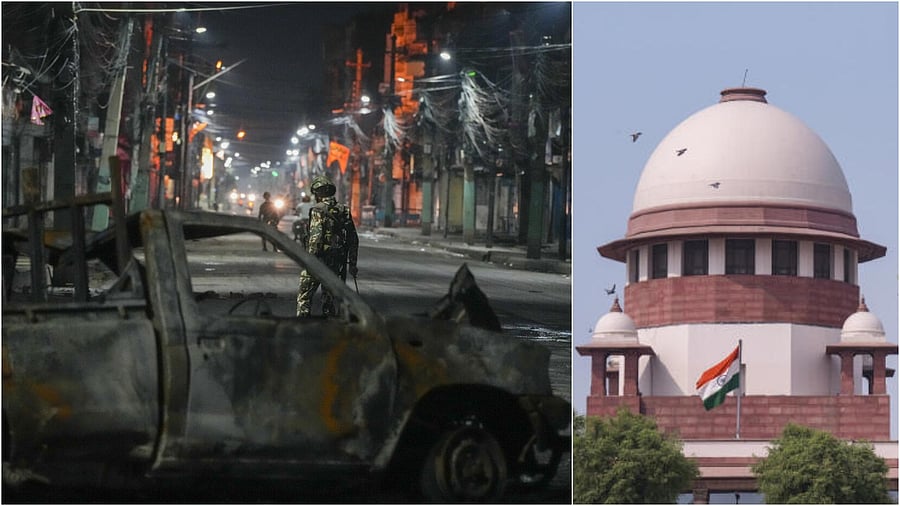
Nepal Army troops patrol streets amid protests(L), Supreme Court of India
Credit: PTI Photos
New Delhi: The Supreme Court on Wednesday commended the Indian Constitution while referring to ongoing violent protests in Nepal, during the hearing on the Presidential Reference on fixing timelines to clear Bills passed by the state legislatures.
A five-judge Constitution bench led by Chief Justice of India B R Gavai referred to the anti-corruption agitation, which claimed lives of 22 people so far.
"We are proud of our Constitution... Look at what is happening in our neighbouring country.... (Nepal)! We have seen what happened in Nepal," CJI Gavai said.
Justice Vikram Nath, also a part of the bench, named Bangladesh, to indicate tensions prevailing in the neighbouring country and last year's violent agitation.
The remarks about the protests in Nepal were made to highlight the stability of India's constitutional framework and the solid democratic set up.
During the hearing in the matter on ninth day, the court said, the nation has been continuing to function for the last 75 years with the Constitution and the democracy, irrespective of whether 90% of Bills have been withheld or 50% Bills have been withheld.
The court also indicated that it would reserve the judgement on Thursday.
The bench also comprised Justices Surya Kant, P S Narasimha and Atul S Chandurkar.
In his arguments, Solicitor General Tushar Mehta, appearing for the Union government, contended that out of the seventeen thousand bills that have been assented to by the Governors of various states since 1970, only 20 have been withheld by the Governor or the President.
He said more than 90% Bills are passed within one month. Some are passed within three months, and there is another category of Bills which are passed within six months.
He maintained that withholding a Bill is an option, and not a power of the Governor.
"Only the ones which are “atrociously unconstitutional” are withheld, he submitted.
Mehta also contended that essentially, the Governor's role will have to be as a guardian and protector of the Constitution, a representative of Union of India, and a person who works in interest of the entire nation, because he represents the President of India and everything he should do in consultation and collaboration with the Council of Ministers.
Mehta said often there are consultations, meetings, and discussions between the chief minister and the governor on issues associated with the Bills.
"This is how the Constitution works and has worked. Now we are raising a false alarm that there is a need to do something," he said.
The bench, however, asked Mehta how he could say a false alarm has been raised by the Opposition states when the bills are pending with the governor for four years. "How can you? Bills are pending with the Governor for four years," the bench said.
Senior advocate Kapil Sibal contended, Bills were pending for more than three or four years in West Bengal, but Mehta did not give any data. "All this is happening after 2014, and not before that," he claimed.
The bench, however, said, what happened before 2014 and what is happening after 2014 is not relevant for the court.
Senior advocate P Wilson, appearing for party, contended that the court cannot act as a layer between the Governor and a Bill becoming a law. He said that the April 8, 2025 judgment in State of Tamil Nadu Vs Governor of Tamil Nadu is an answer for the questions referred by the President.
Senior advocate Sidharth Luthra, appearing for the State of Andhra Pradesh, submitted that he supported the Union government on all aspects but one.
"We have supported the Union on all issues but to say that Article 32 petitions will not lie in all cases by State, that is something which we cannot accept. Because where issues of pollution, man-made disasters and sub judice matters are pending, in those situations one cannot say that you should not be going under Article 32," he said.
